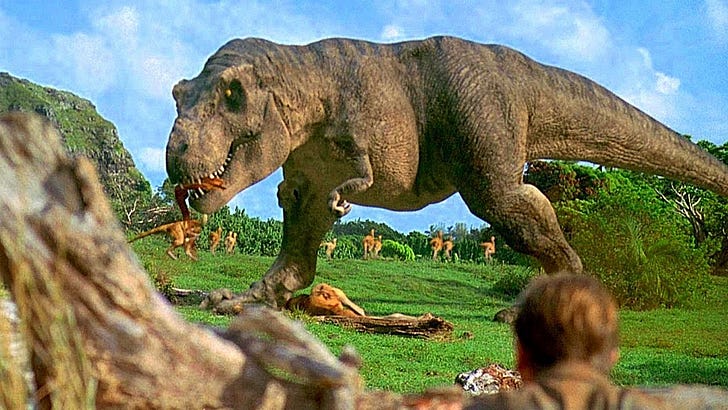One of the T-Rex scenes in “Jurassic Park”
Were dinosaurs so dumb as they are said to be? Maybe not. That’s the thesis of a 2023 paper by Susana Herculano-Houzel (from now on, “HH.” The paper is behind a paywall; if you want a copy, ask me). You can find a summary here.
HH developed a sophisticated method to count neurons in brains and has applied it to a variety of species. The results are incredibly interesting. The old idea is that there is a specific correlation between body mass and brain mass, and that this ratio is related to intelligence. It is not wrong, but brains are not all the same. HH measures what the number of “pallial,” or “telencephalic,” neurons. It is their absolute number, rather than the ratio to the body mass, that determines the cognitive ability, aka, “intelligence”
And here comes the story of the Tyrannosaurus Rex. According to HH, the number of telencephalic neurons of the big beast is comparable to that of a modern primate, not much lower than that of a Chimp. Hence, T-Rexes should have been able to display complex behaviors similar to those of modern primates. Maybe they hunted in groups, or they used ambush techniques, something like that. Amazing! For those of us who are dinosaur fans, it is a joy to hear this!
Now, to temper the enthusiasm a little, let me say that HH’s interpretation has been criticized by other researchers who say that the number of telencephalic neurons in the T. rex is much smaller than she estimates. That doesn’t change things so much: our friend, the T. rex, was still an impressive animal, probably not dumb at all! The way it has been represented in recent movies, for instance the “Jurassic Park” series, was approximately correct.
The point I wanted to make, here, is that I recently proposed that the metabolic cost of a brain could only be paid by a fast metabolism operating in low CO2 concentrations in the atmosphere. How does this idea fit with the data on T-Rex?
It fits reasonably well. During the Jurassic, CO2 atmospheric concentrations were relatively large, probably not lower than 2000 ppm (today they are a little over 400 ppm, used to be 280 ppm before humans made the mess they are making.). Hence, according to my interpretation, Tyrannosauruses should have had small brains. And they did:
I could also propose that, as predators, tyrannosauruses were under an evolutionary pressure to develop complex and sophisticated behaviors. They did the best they could but they couldn’t enlarge their brains more than so much, because the high CO2 concentration hampered the transport of oxygen to the tissues. So, they structured their brain in such a way to have a relatively large number of telencephalic neurons. Maybe not so large as HH proposes, but large nevertheless.
But then, why such large bodies? Weren’t they a metabolic cost, too? Yes, but the brain is more than 20 times more expensive than muscle tissue in terms of energy. It is not so expensive to create and maintain a large body — what is really over the top is a large brain. So, the lower oxygen supply for tyrannosauruses may have caused them to have less stamina than modern carnivores. Nevertheless, they could probably sprint fast and catch their prey.
Let me hasten to say that all this is just a tentative interpretation, but the more I delve into this story, the more fascinating I find it. In any case, Gaia surely knows how smart tyrannosauruses were. But she won’t tell us.







Sharks are really good at being sharks.
Given the opportunity, I would NEVER second-guess a tyrannosaur!
;-o
Non credo che il costo metabolico di un cervello, per dire, di 10 kg sarebbe stato così tremendo per un animale che ne pesava 6 o 7000. Secondo la stima che presenti, 10 kg sarebbero stati equivalenti ad uno o due quintali di muscoli, di nuovo, niente di trascendentale. È’ che probabilmente aveva tutto il cervello che gli serviva. Credo tu abbia ragione quando evidenzi che il legame peso cervello/peso corpo non è tutto. Vale per la parte del parasimpatico, per tutto ciò che gestisce il non senziente/ elaborante. Ma se ti avanzano 100 miliardi di neuroni fuori dalla gestione sensoriale e corporea,
Puoi farci cose, a prescindere da un corpo di sette metri o 1.6. Insomma secondo me gli avanzavano neuroni a sufficienza per guardarsi intorno in maniera sufficientemente intelligente da essere vivace e letale come in jurassic park. I nostri antenati si sono sviluppati in contemporanea so dinosauri e sono stati tenuti ai margini per cento milioni di anni.
Significa che non erano ne più furbi ne più agguerriti, anzi. Quindi: non condivido il legame CO2/ cervello ma per il resto concordo.